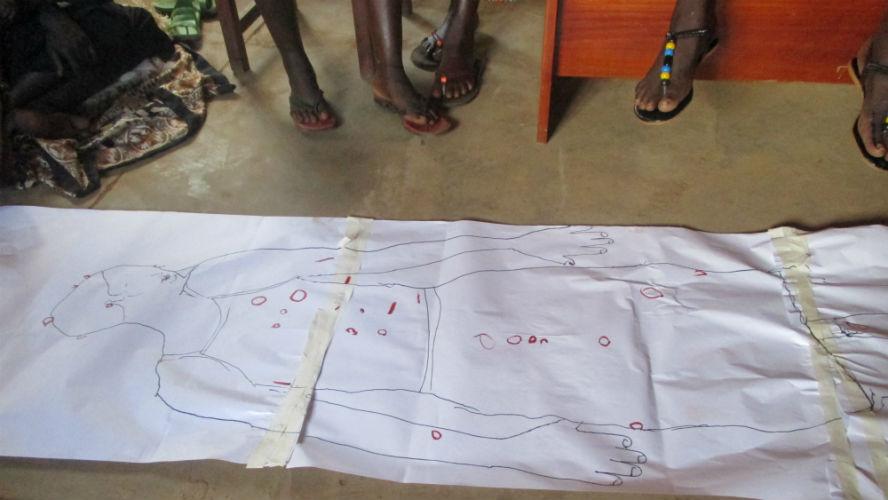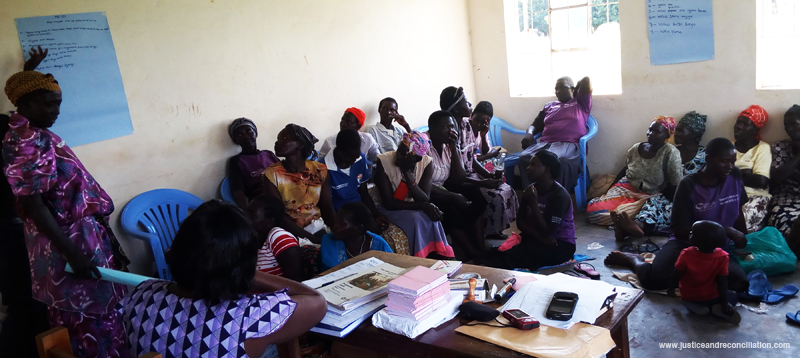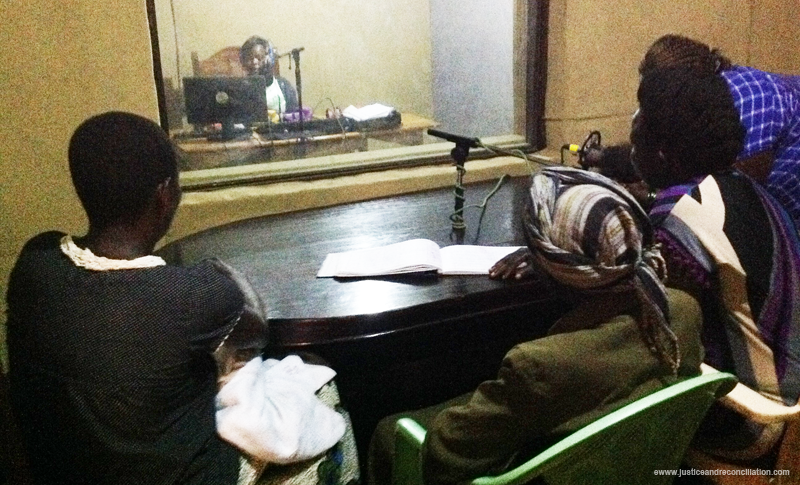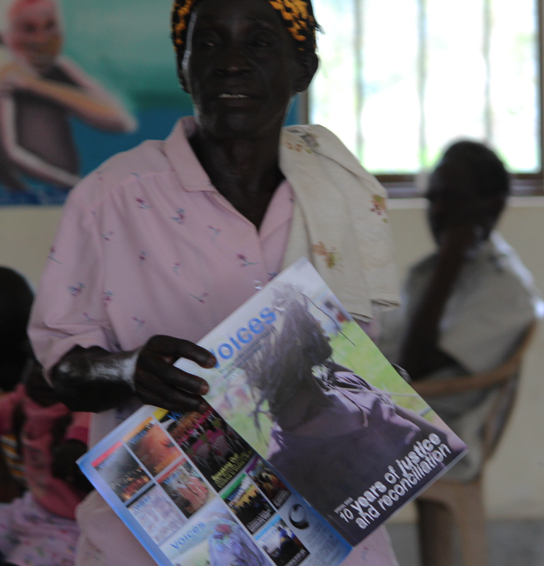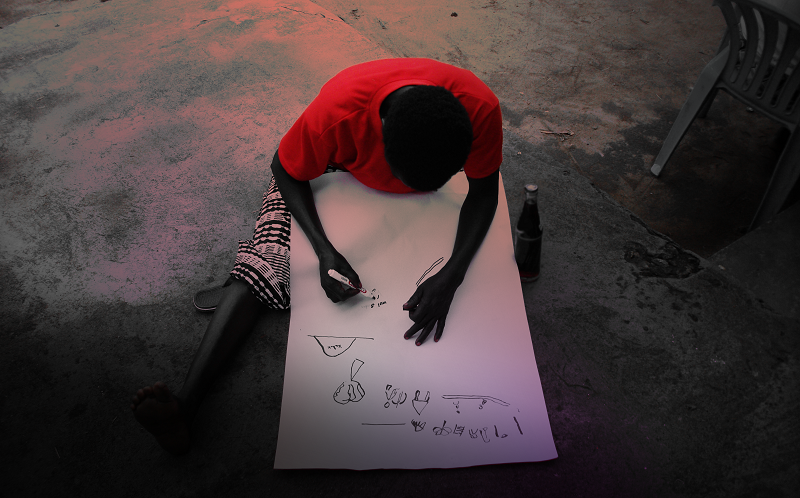Oryem Nyeko: Hi this is Oryem Nyeko, I am here with Lindsay McClain Opiyo who is the team leader for Gender Justice here at JRP. We are trying something new – we are trying to do a podcast. This is our first episode and we are very excited.
We are here to talk about a new publication that JRP has just put out which is a field note called “My Body, A Battlefield”.
Lindsay is a co-author and Lindsay I wanted to hear from you what this field note is all about. Maybe if you can give us an overview of this report?
Lindsay McClain Opiyo: Thanks Oryem. Yeah, this is our latest field note from JRP that is looking at everyday experiences of conflict-sexual violence in Koch Ongako, a community in Gulu district here in northern Uganda.
The field note is documenting men and women’s experience of conflict sexual violence during northern Uganda’s long standing conflicts both at the hands of state and non-state armed actors and also at the hands of civilians when they were living in internally displaced person’s camps.
There’s kind of three big takeaways that we would like people to have from the report. One, is that it doesn’t take a big massacre or a big event to make peoples experiences during the war worthy of documentation. As readers will find from the report, a lot of the accounts are of women and to some extent men just going about their daily lives during the conflict and how they were targeted for sexual violence by different conflict actors.
Two would be the importance of methodology when you are actually trying to document and preserve accounts of conflict sexual violence. All too often especially with prosecutions and court processes, investigations, it’s very cut and dry, and we use methodologies like storytelling and focus group discussions in order to get people to open up about these very stigmatized events that happened to them. And that’s our second takeaway that it’s important to use this more informal methodologies to document these experiences.
And our third takeaway is that it is very important to have documentation of these experiences in order for survivors to advocate for redress. So we hope that the report will be something that survivors can actually use when they are petitioning government and other bodies for reparations and other forms of redress for what they went through.
(Oryem) We know that this is just one community in northern Uganda that experienced this conflict. How emblematic do you think that it is, in terms of the bigger picture of sexual violence on questions of accountability and healing and so on?
(Lindsay) Our sample size was relatively small. We talked to 60-something people. A little over 50 of them admitted to being survivors of conflict sexual violence, so it is not a humongous sample size and we were exclusively looking at Koch Ongako. But what we found within those accounts is that a lot of patterns started to emerge. One of the most interesting ones was this idea of dangerous spots and that due the nature of women’s lives during the war that they were targeted for conflict sexual violence while they were going about daily life, while they were going to the gardens to dig, while they were even going to buy salt to cook for their families.
So one would imagine that this is fairly representative of other communities within northern Uganda. There is nothing about Koch that would necessarily make it different from other communities but it is definitely something that would merit more research to see the extent to which these lots of pardon also were in other communities.
(Oryem): I’m here now with Nancy Apiyo who is a co-author of My Body, A Battlefield and she was here in 2013 when the Gender Justice team began the research process for this field note in Koch Ongako.
I wanted to know from you Nancy, what was that process like doing this documentation? Obviously these stories are very painful and I imagine it was very traumatic for some of those survivors to talk about their experiences. So could you tell us a bit more about what you witnessed when you went though this documentation process?
Nancy Apiyo: When we started to work with the community of Koch in about 2012, we noted that from the stories that the women would share there were stories of violations during the conflict of sexual violation and violations of that nature. Most of the women we interacted with at that time mentioned to us that they were living positively with HIV and most of them linked it to the conflict and some mentioned that they got the HIV out of the rape.
So as a team we were touched by this and we did not want it to just stop there, we didn’t want these stories to only remain in those storytelling circles because the first objective of those storytelling was for healing purposes, to build confidence around the women and we did not have this idea of publishing these stories out to the public. But when we heard this we felt it was important to let the world know what really happened in Koch and break this silence of what the community went through during the conflict around that time. So we had a discussion with the women about what they thought about more people outside the community knowing what they went through and if that was important to them and they responded that it was important that the rest of the world knows what happened to them in the community. And that is when we got this idea of publishing this story or beginning to write and have an account of what happened in Koch during the conflict.
(Oryem) Where there some people who, maybe, didn’t feel comfortable speaking out in the beginning but eventually opened up a bit more as the process went along?
(Nancy) There were women who once they heard others talk they also began to open up and they were like, “When I heard her story it compelled me to also talk about my own story. I felt that actually what she went through is even worse than what I went through and this alone gave me the courage to also stand up speak about what I also went though.”
I think listening to each other’s story and knowing the fact that they all went through these things, they identified with each other and giving them also the confidence to speak by listening to someone’s story they also get the courage to also talk about their own stories.
(Oryem) I know that the field note doesn’t just talk about the experiences of women, there are also some quotes that you have from men. What was that process like, getting the stories from the men?
(Nancy) We didn’t have men at first. Our first plan was to talk to the women and get in to the sexual violence that women went through. But as we worked with women they informed us that there were also men who also went through SGBV but they were quiet and nobody was reaching out to them. So we told them that if they wanted the men’s stories also to be out, that is also up to the community to decide and it would be also important. So it’s the women who reached out to the men, talked to them and brought them into the storytelling circles and the men were also able to share their stories. Although with the men we had a one-on-one interviews with them and not a group kind of thing.
But the good thing with this documentation also the methods that we kept on using, using pictures, songs, dramas, sometimes they act out these issues, sometimes they draw them in pictures. Things like that. Such exercises helped to reduce the tension around violation and make the women relax, and the men, and enable them to talk.
(Oryem) Was there any particular story that struck you individually as a person that you could tell us about?
(Nancy) One of the women who had been raped – gang-raped, actually, by the government soldiers and she had tried to get justice in vain and had given up and had moved on, okay tried to move on. And so, during this day she was not in the first lot of women that we shared stories with or we listened to and as time went by, I think, a year later, her colleagues asked her to join the storytelling circle. They informed us that there is this lady we know that she really went through something very bad and it would be good for her to benefit from this. So, during one of the retreats, they brought her. They had already talked to her and she had accepted the whole thing and so she came.
I remember one of her first statements was she thought that she would never have the opportunity to share this story to anyone. She would never be listened to again. And to her the fact that this documentation process was an opportunity for her and all those other women who have gone through sexual violence to get justice. And to her the reason why she came for that particular storytelling at that time for that retreat was so that women who were violated get justice and it wasn’t for her, it was for somebody out there who went through the same thing that she went through to get justice and so that the world to knows that these things really happened. She wanted people to listen to what she went through.
And so this lady told us all the details of how she was raped, the whole experience. There is a book that I read where we are told that sometimes when somebody is being raped they get numb at that particular time and they are oblivious of what is happening and may not know even what is happening and when it comes to narrating, they may not give you all the details of maybe, he unzipped like this, he turned me like this or this is what they did. But this lady gave us all the details of what really happened that day and to me I think that is the story that really changed… and that is the story that kept me going to really write this and I really wanted this report to come out. That is the story that stood out for me most.
(Oryem) What do you hope is going to happen with this publication, with this being disseminated all around the world? What do you hope? What’s your goal?
(Nancy) For now, I think the short term goal for now as I see is first of all to break the silence. There is no much documentation of sexual violence that happened in the camps. Most of the narratives we have been hearing was for abduction and things that happened in captivity but not really what happened in the camps during the conflict. So me I think, step one, that this report is going to do is to share that really sexual violence happened in the camps, the stories.
There are reports I know of what happened… Human Rights Watch indicating this and this, but the narratives from the community indicating that this happened, so I think this report is first of all going to contribute towards that knowledge that during camps, the same people who were supposed to protect the people did this and even at the hands of the community themselves, the women faced this kinds of violation.
(Oryem) I want to close, with a question about the title, My body, A Battlefield. Could you tell us how that title came about?
(Nancy) During one of the discussions we had with the local leaders, one of them mentioned that men suffered in the war but the women suffered using their bodies. During the war it’s their bodies that suffered, and to me that is the statement that stood out for me and that is where we got the title for this book that my body was a battlefield to show how during the war, the battlefield was actually the woman’s body. Women were not taken maybe to be as soldiers. Those who were at the camps were not recruited as mobiles. They were not beaten or made to do hard labor but as soon as she is got, she is raped and that is the kind of punishment that women faced during the conflict. They felt the brunt of the conflict on their bodies. That statement really stood out for me and that is how we got the title of the report.

